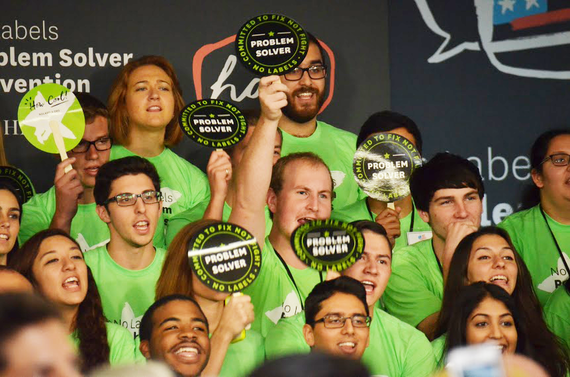I've seen the future of American politics and it's brighter than you might think.
Last week, I traveled to Manchester, New Hampshire to attend the No Labels Problem Solver Convention, where the focus was on both parties overcoming partisan divides to agree on a feasible, but far-reaching national agenda. Over 1,500 citizens watched eight presidential candidates and numerous party leaders come together for constructive dialogue and commonsense ideas, the kind of positive inter-party interaction this country hasn't seen since the early 1980s. For some historical perspective, this was years before a vast majority Americans had even heard of the word "Internet."
As the Founder of Practically Republican and a supporter of the No Labels College Program, I was there to speak to 100 college students from around the U.S. who all traveled to New Hampshire to participate in the process of becoming political activists. My talk was entitled: The Moment is Now: The Next Generation's Important Role in Electoral Politics. But to be clear, these young people aren't just important; they're actually the engines that are going to drive change in this country.
One might ask how this will happen when studies show that so many college students are frustrated with Washington's dysfunction and have little or no interest in being part of a flawed system? According to The Center for Information and Research On Civic Learning and Engagement, 19.9 percent of 18-29 year-olds cast ballots in the 2014 elections. That was the lowest youth turnout rate ever recorded in a federal election. In 2012, 45% of young people, ages 18-29, voted, down from 51% in 2008. A study by Fair Vote found that only 59% of eligible voters age 18-24 are registered. So let's be honest; it will be a huge challenge to turn anger and apathy into action. Yet after my experience in New Hampshire, I have a renewed sense of optimism about the potential of young people in politics.
Why this sense of hopefulness? First, both young Democrats and Republicans were represented at this program. Second, it was clear that they grasped the value of seeing each other as allies, not adversaries. Third, I cannot emphasize enough how passionate and driven these students are. I actually missed some of the national speakers the next day because so many of them came up to me to talk politics. They asked detailed questions in terms of the candidates and issues and there was a visceral sense of excitement about the role they could play in having an impact to improve the system.
Now, I'm not naïve enough to think that this was your typical sample set of students, but I do believe that if enough young people get excited and energized, they can inspire and motivate others who might not be as prone to get involved. This group is one of the vanguards of a new generation of political activists who will focus on real issues, not party affiliation, and they won't settle for polarized gridlock. Their colleges and universities will be petri dishes for the growth of new ideas and movements; the mission is to spread these cultures throughout their communities, to be a part of a real-life experiment in politicking and problem solving.
During my talk, I asked for a show of hands on the percentages of how many of their friends were registered to vote and how many planned on voting in 2016? The results were predictable -- most said at least 50% of their peers weren't registered or weren't going to vote. So I urged them to share a simple concept within their academic and social circles. There is still one thing that big money in politics can't buy. Our votes. Politicians care most about one thing -- getting elected or re-elected. So public opinion and citizen participation do matter. The truth is our generation is leaving theirs many complex problems and issues to solve, and they will have no choice but to be the reformers and transformers this country so desperately needs. And the accountability of our politicians can only go up.
I will never forget the looks on all those young faces of the No Labels college leaders. Too many of us "older folks" have forgotten what it feels like to really believe in a political cause and put ourselves out there in our personal and professional communities. To feel like we can make a difference and even more, be the difference. And in many ways, these young citizens can run rings around us by utilizing social media, a limitless resource for information and participation. But it's worth noting that these aforementioned studies show that the most effective way of getting a new voter is personalized, interactive contact, so these change agents will also need actual, not just virtual, face time with their peers. Personal contact is still an extremely powerful app.
The good news is that someday in the not too distant future, I expect to see some of these same college students running for national office. Now, those are some elections I'm really looking forward to.

